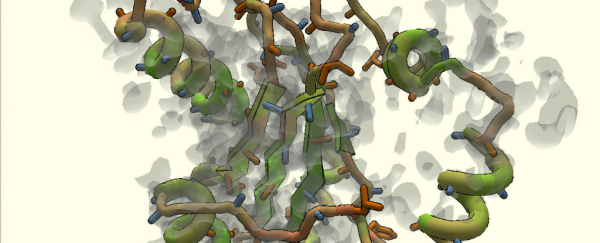Gamers playing the science-based online game Foldit have recently beat trained scientists in a competition to see who could complete an accurate model of a specific protein the fastest, based on biochemical data given to both teams.
The team who led the competition says that the findings prove that gamers – or citizen scientists – can have a huge impact on fields that were once closed off to the public, and that gaming might be a great way to get more people interested in scientific studies.
"It shows that anybody with a 3D mentality, including gamers, can do something that previously only scientists did, and in doing so they can help scientific progress," said the study's co-author James Bardwell, from the University of Michigan.
The competition pitted 469 gamers playing Foldit, two highly trained crystallographers, two computer algorithms, and 61 undergraduate students using computer modelling programs against each other, in a battle to see who could accurately create a model of the protein YPL067C by interpreting electron-density maps.
In the end, the gamers came together to go through the painstaking trial-and-error process that comes with protein modelling and created the most accurate version of any one group.
The researchers conducting the study conclude that higher levels of cooperating and teamwork might be the cause of their success.
"We think this is a big deal because interpreting an electron-density map can be a labour-intensive, error-prone process – and we show that crowd-sourced Foldit players can do it as well as, or better than, professionally trained crystallographers," said team member Brian Koepnick, from the University of Washington.
The team also says that the competition's results show that games might be an effective way to teach students about protein modelling because it makes the rather time-consuming process more fun and collaborative in a way that traditional learning doesn't.
"I've seen how much players learn about proteins from playing this game," said co-author Scott Horowitz, from the University of Michigan. "We spend weeks and weeks trying to jam this into students' brains and Foldit players learn it naturally because it's fun."
Even cooler, the team says that the gamers also might have found a new type of protein that might be responsible for controlling plaque formation, which, with more study, might lead to a better understanding of Alzheimer's.
This isn't the first time researchers have turned to citizen science for help. Back in April, a team of researchers from the UK installed 75 cameras in Antarctica and asked the public to keep an eye on a bunch of adorable penguins to see how climate change is impacting them.
Also, back in August, a team of astronomers in the UK recruited about 4,500 citizen scientists to analyse weather data to see if a partial eclipse had any effect on weather patterns.
The ability to reach out to the general public is beneficial because it allows researchers have a much bigger, more detail-oriented team working with them. Plus, there's always the added benefit of bringing more attention to science and research.
The new findings have been published in the journal Nature Communications.
